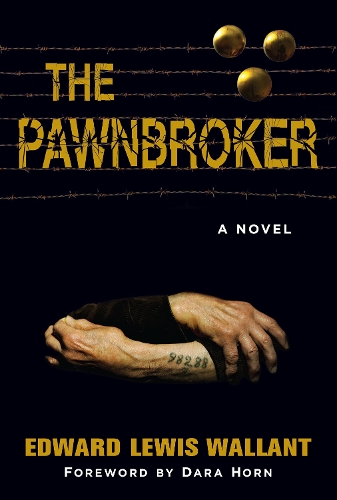
The Pawnbroker: A Novel
(Paperback)
Publishing Details
The Pawnbroker: A Novel
By (Author) Edward Lewis Wallant
Foreword by Dara Horn
Fig Tree Books
Fig Tree Books
10th November 2015
United States
Classifications
General
Fiction
813.54
Physical Properties
Paperback
279
Width 152mm, Height 228mm
411g
Description
For most of us, remembering the Holocaust requires effort; we listen to stories, watch films, read histories. But the people who came to be called survivors could not avoid their memories. Sol Nazerman, protagonist of Edward Lewis Wallants The Pawnbroker, is one such sufferer.
At 45, Nazerman, who survived Bergen-Belsen although his wife and children did not, runs a Harlem pawnshop. But the operation is only a front for a gangster who pays Nazerman a comfortable salary for his services. Nazermans dreams are haunted by visions of his past tortures. (Dramatizations of these scenes in Sidney Lumets 1964 film version are famous for being the first time the extermination camps were depicted in a Hollywood movie.)
Remarkable for its attempts to dramatize the aftereffects of the Holocaust, The Pawnbroker is likewise valuable as an exploration of the fraught relationships between Jews and other American minority groups. That this novel, a National Book Award finalist, remains so powerful today makes it all the more tragic that its talented author died, at age 36, the year after its publication. The book sold more than 500,000 copies soon after it was published.
Reviews
"In the short time [Wallant] was writing - about three years wherein he considered himself and was considered a serious writer - he was counted as part of a brilliant group of postwar Jewish American writers - Saul Bellow, Bernard Malamud, Norman Mailer and Philip Roth among them. That Wallant died so young, unable to travel on with these writers, is criminal, especially given how prolific he was. But the novels he finished in his short life are all miniature masterpieces." -- Dave Eggers "[R]eminiscent of Dostoevski...on every count [The Pawnbroker] deserves the attention of every serious reader." -- Thomas Lask, The New York Times "Wallant has...written an honest and moving book about human experience at its most dismal." -- R. D. Spector, New York Herald Tribune "Edward Lewis Wallant is a gifted writer who probes with a kind of troubled tenderness into pools of human darkness." -- David Boroff, Saturday Review "Sol Nazerman, the erudite Shylock of Harlem, is a creature of fasicnating complexity...he is that literary rarity--the character whose sorrows seem as real as the reader's own." -- TIME magazine "Well written and painfully memorable." -- George Adelman, Library Journal "[T]he book gains energy from its plot, which involves a mobster and a planned robbery that puts Sol in an awful position that Wallant thoughtfully interrogates throughout: how do you trustfully navigate the world when you've experienced the worst that people are capable of" -- Kirkus Reviews "No contemporary novelist was more gifted in the sheer grace of constructing a novel..." -- Charles Alva Hoyt "an American naturalist in the tradition of Dreiser and Norris..." -- Robert W. Lewis We don't need to imagine how shocking The Pawnbroker must have been to readers in the early 1960s because it is still that shocking to us. Without a trace of sentimentality, Edward Lewis Wallant wrote the Great American Novel of Redemption. Before anyone else, he showed us that only by recognizing in others the face of human suffering could the individual survivor--whether male or female, Jewish, black, or Puerto Rican--transcend his or her inheritance of trauma and pain." -- Eileen Pollack, author of In the Mouth and Breaking and Entering "Post-Holocaust novel par excellence. Timeless and well ahead of its time. Lose yourself in Wallant's lyrically imbued world of traumatic memories and its collision with contemporary life." -- Thane Rosenbaum, author of The Golems of Gotham, Second Hand Smoke, and Elijah Visible
Author Bio
When he died at 36 in December 1962, Edward Lewis Wallant had published two novels: The Human Season (1960), which received the Harry and Ethel Daroff Memorial Fiction Award for the year's best novel on a Jewish theme, and The Pawnbroker (1961), which was nominated for the National Book Award and secured Wallant a Guggenheim Fellowship. Two additional novels--The Children at the Gate and Moonbloom--were published posthumously. The Daroff Award was subsequently re-named in Wallant's honor. The Edward Lewis Wallant Award is now presented annually at the University of Hartford in the late author's native Connecticut; recipients have included Chaim Potok, Cynthia Ozick, Francine Prose, and Dara Horn. Dara Horn is the author of four widely acclaimed novels and the recipient of honors including the National Jewish Book Award, the Reform Judaism Fiction Prize, the Harold U. Ribalow Prize, and the Edward Lewis Wallant Award. She earned a PhD in comparative literature from Harvard University and has taught courses in Jewish literature and Israeli history at Sarah Lawrence College and The City University of New York; in 2014, she held the Gerald Weinstock Visiting Professorship in Jewish Studies at Harvard, where she taught Yiddish and Hebrew literature. She lives in New Jersey with her husband and four children.
